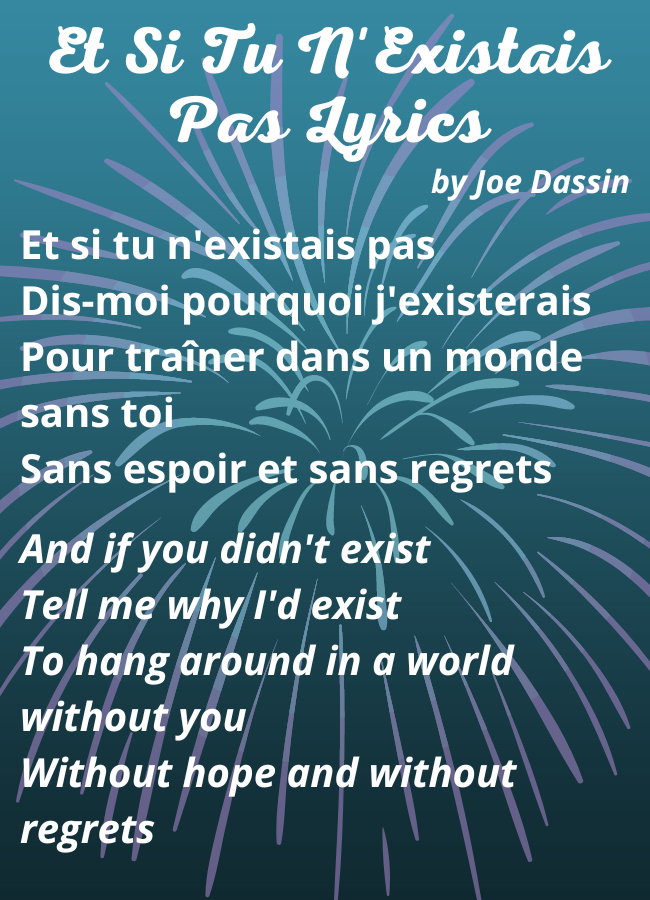Et Si Tu N’Existais Pas Paroles
Et Si Tu N’Existais Pas (Meaning: And If You Didn’t Exist; pronunciation e si ty n’ɛgziste pa) is a song by French-American singer, Joe Dassin (1938-1980). Released in 1976, the lyrics were written by Pierre Delanoë. Et Si Tu N’Existais Pas and Les Champs-Élysées are among Dassin’s greatest career hits.

Song overview
The song, “Et Si Tu N’Existais Pas“ is a love song in which the singer is asking himself how his life would be if his lover didn’t exist. Each verse starts with “And if you didn’t exist”.
Then, the singer follows with various questions and scenarios illustrating how his life would be without his lover. For example, he describes trying to “invent” love by himself, sleeping with people he doesn’t love and an overall sentiment of feeling lost.
Towards the bottom of the post we’ve included two YouTube videos for “Et Si Tu N’Existais Pas”. The first is the official video by Joe Dassin. The second is a version released in 2013 by French singer Hélène Ségara.

Et Si Tu N’Existais Pas – song title meaning
The first two lines of the song are: “Et si tu n’existais pas, Dis-moi pourquoi j’existerais”, which translate to “And if you didn’t exist, Tell me why I’d exist”.
The first line and title is in the imperfect tense (mostly used for describing past events) and the second line is in the conditional tense (the “would” tense in French).
This is an example of a si-clause using the imperfect and conditional. These are clauses are used to describe hypothetical situations: “Si + imperfect, then + conditional”.
Hence: “Et si tu n’existais pas (imperfect), Dis-moi pourquoi j’existerais (conditional).
Lyrics analysis
In the following section we go through the song line-by-line and highlight interesting points about French grammar and vocabulary
Pour traîner dans un monde sans toi, Sans espoir et sans regrets
These two lines of the first verse translate to “To hang around in a world without you,
Without hope and without regrets”. The verb “traîner“ has several translations including “to drag (an object) around”, “to hang around” or “to dawdle” and “to lag behind”. The preposition “sans” means “without”.
J’essaierais d’inventer l’amour
This line translates to “I would try to invent love”. The verb “essayer“ is always followed by de + infinitive. For example, “J’essaie de chanter” (I try to sing). This page covers verbs followed by de.
Comme un peintre qui voit sous ses doigts
This line translates to “Like a painter who sees under his fingers”. “Un peintre” means “painter” and the verb “peindre” means “to paint”. For the word “doigt” (finger), the -gt are silent. This page covers body parts vocabulary.
Et qui n’en revient pas
This line translates to “And can’t believe it”. The verb “revenir“ means “to come back” or “to return”. However, the expression “ne pas revenir de quelque chose” means “to not be able to believe something”. Hence, “Je n’en reviens pas” means “I can’t believe it”.
Des passantes endormies dans mes bras, Que je n’aimerais jamais
These two lines translate to “Passers-by sleeping in my arms, Who I’d never love”. In French the word “passant“ translate to “passer-by”. The word “que“ in these lines is a relative pronoun and means “that”, “which” or “who”. “Aimerais” means “would love”; aimer in the conditional tense. The word “jamais” means never, and is a more advanced French negation.
Je ne serais qu’un point de plus
This line translate to “I’d just be one more point”. “Serais” (would be) is the conditional form of the verb “être“ (to be). The ne…que negation structure means “only” in French.
This line was difficult to translate. The essence of the line is that the singer is saying that if his lover didn’t exist, he’d seem insignificant in the world, like “one more number”.
Dans ce monde qui vient et qui va
This line translates to “In this world that comes and goes”. “Va” (go) and “vient” (comes) come from the verbs “aller” (to go) and “venir” (to come). The word “qui” is this line is a relative pronoun meaning “that”.
Je me sentirais perdu, J’aurais besoin de toi
These two lines translate to “I’d feel lost, I’d need you”. The verb “sentir“ means “to smell” and “to feel”. As a reflexive verb, “se sentir” means to feel within oneself. “J’aurais besoin” means “I would need”. This is the verb “avoir” (to have) conjugated in the conditional tense. “Avoir besoin de“ means “to need”.
Dis-moi comment j’existerais
This line translate to “Tell me how I’d exist. The word “comment“ means “how”.
Je pourrais faire semblant d’être moi
This line translate to “I could pretend to be myself”. “Je pourrais” means “I could”. This is the verb “pouvoir“ (can, able to) conjugated in the conditional. The expression, “faire semblant” means to pretent.
Mais je ne serais pas vrai
This line translate to “I would not be genuine”. The adjective “vrai“ translate to “true” as well as “genuine”, “real” and “authentic”.
Je crois que je l’aurais trouvé
This line translate to “I think I would have found it”. “Je l’aurais trouvé” is the past conditional of “trouver” (to find), meaning “would have found”.
Le secret de la vie, le pourquoi
This line translates to “Life’s secret, the why”. “Pourquoi“ means “why?” in French but is being used as a noun in this line.
Simplement pour te créer, Et pour te regarder
These two lines translate to “Simply to create, And to look at you”. The “te” in these lines translates to “to you” or “at you”. This page explores ways to say “you” in French.

Et Si Tu N’Existais Pas French Lyrics & English Translation
Et si tu n’existais pas
Dis-moi pourquoi j’existerais
Pour traîner dans un monde sans toi
Sans espoir et sans regrets
And if you didn’t exist
Tell me why I’d exist
To hang around in a world without you
Without hope and without regrets
Et si tu n’existais pas
J’essaierais d’inventer l’amour
Comme un peintre qui voit sous ses doigts
Naître les couleurs du jour
Et qui n’en revient pas
And if you didn’t exist
I would try to invent love
Like a painter who sees under his fingers
Born the colors of day
And can’t believe it
Et si tu n’existais pas
Dis-moi pour qui j’existerais
Des passantes endormies dans mes bras
Que je n’aimerais jamais
And if you didn’t exist
Tell me for whom I’d exist
Passers-by sleeping in my arms
Who I’d never love
Et si tu n’existais pas
Je ne serais qu’un point de plus
Dans ce monde qui vient et qui va
Je me sentirais perdu
J’aurais besoin de toi
And if you didn’t exist
I’d just be one more point
In this world that comes and goes
I’d feel lost
I’d need you
Et si tu n’existais pas
Dis-moi comment j’existerais
Je pourrais faire semblant d’être moi
Mais je ne serais pas vrai
And if you didn’t exist
Tell me how I’d exist
I could pretend to be myself
But I wouldn’t be genuine
Et si tu n’existais pas
Je crois que je l’aurais trouvé
Le secret de la vie, le pourquoi
Simplement pour te créer
Et pour te regarder
(Et si tu n’existais pas)
And if you didn’t exist
I think I would have found it
Life’s secret, the why
Simply to create
And to look at you
(And if you didn’t exist)
Et si tu n’existais pas
Et si tu n’existais pas
And if you didn’t exist
And if you didn’t exist
Et si tu n’existais pas
And if you didn’t exist
Listen to “Et Si Tu N’Existais Pas” On YouTube & Spotify
The official YouTube video for “Et Si Tu N’Existais Pas” has over 73 million views on YouTube. Dassin also released a Spanish version of the song, Y Si No Existieras.
The following is Hélène Ségara’s 2013 version of the song when she did in posthumous duet-form. Ségara’s YouTube video has over 26 million views.
You can also listen to the song on Spotify:
Become an expert in French song lyrics!
Using song lyrics is a wonderful way to learn French. Our site offers extensive coverage including line-by-line analysis for Edith Piaf’s classic songs “La Vie Rose“, “Non, Je Ne Regerette Rien“, “Milord“, “Mon Dieu“, “Sous Le Ciel De Paris“. We also offer pages covering the following classic French songs: “Ne Me Quitte Pas” and “Le Port d’Amsterdam” (Jacques Brel), “La Mer” (Charles Trenet), “La Bohème” (Charles Aznavour), “C’est Si Bon” and “Les Feuilles Mortes” (Yves Montand) and “Dominique” (Singing Nun).
